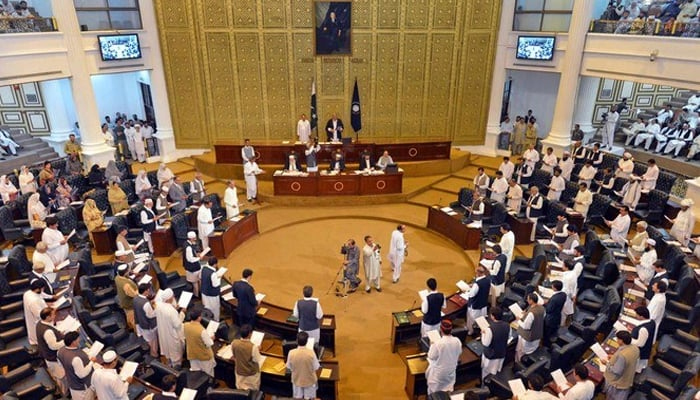A call for human-centered governance in Balochistan
Balochistan's struggles are often attributed to a failing state, but the root-cause remains hidden: the predatory actions of a morally bankrupt political and bureaucratic elite.
These powerful figures control immense resources from Sui's natural gas wealth to the province's mineral riches. However, their control does not translate into public prosperity, but rather personal enrichment. Billions vanish into their coffers, leaving the local population struggling for basic necessities.
It is convenient to blame the state, but it ignores the deep-seated corruption nurtured by this elite.
Their influence permeates every corner of governance, particularly the Public Sector Development Programme (PSDP), now synonymous with graft in Balochistan. While militancy may be geographically contained, its legacy fuels the fire of misgovernance. The elite thrives on this perception, exploiting grievances to extract concessions and maintain the status quo.
These self-proclaimed representatives wield private militias, bolstered by a toxic mix of state patronage, corruption and even drug money.
They weaponise "militancy" for political leverage, manipulating both state and anti-state actors (militants) with promises of neutralising the insurgency — not out of genuine concern, but for personal gain.
The Makran belt with neighbouring districts, yielding two chief ministers, exemplifies this opportunism, highlighting how power fuels ambition, not public service. The state, desperate for stability, co-opted them by showering them with top offices, perpetuating the cycle of enrichment.
The state has consistently bowed to the demands of these power brokers. Even indirect support abounds, be it free electricity in border belts or turning a blind eye to lucrative smuggling operations involving Iranian oil and Afghan reverse transit trade with the sole aim to reach out to the general populace.
Meanwhile, ordinary citizens bear the social and economic consequences of this elite capture. Access to healthcare, education and jobs remains a distant dream, while the elite bask in unimaginable luxury. This stark contrast reveals the true tragedy of Balochistan.
This misgovernance isn't simply inefficiency. It's deliberate plunder. Corruption and nepotism reign supreme, choking off job opportunities for ordinary people. Meritocracy is a casualty, with positions sold to the highest bidder. The plight of female employees is particularly egregious, facing discrimination in every aspect of their careers. Some are forced to resort to seeking favours, further perpetuating the corrupt cycle.
The Balochistan issue demands more than mere tinkering. A complete overhaul of governance is necessary, shaking up the dysfunctional democratic setup, replacing it with a system that truly serves the people. Mere elections won't suffice. A fundamental restructuring is needed.
Tackling this issue also requires acknowledging external forces perpetuating the predatory status quo.
Fortunately, common-sense solutions offer hope. Citizen engagement initiatives, transparency measures and robust accountability mechanisms can be the first steps towards dismantling this power structure. Other steps are readily available to follow.
Empowering silenced: Create secure forums for patriotic youth and families of martyrs to share their perspectives, presenting a more nuanced picture.
Sparking development: Prioritise an economic emergency to materialise a comprehensive rail-road network, kick-starting development and connecting remote areas.
Addressing distance and disparity: Establish a South Balochistan secretariat to address the geographical and administrative challenges faced by the region. Quetta's proximity to Islamabad shouldn't overshadow the needs of Turbat and Gwadar. Diversifying employment: Create alternative employment opportunities, focusing on self-employment and entrepreneurial avenues, empowering local communities.
Regulating trade: Curb smuggling by regulating border trade and enhancing cooperation with Iran.
It's time to dispel the myths and unmask the true villains exploiting Balochistan. This province belongs not to the elite, but to the ordinary Pakistanis who bear the brunt of their corruption. Their voices deserve to be heard, their suffering acknowledged and their future secured. Until we address the true cause of their misery — the insatiable greed of the elite — Balochistan will remain trapped in a cycle of despair, a tragedy we can no longer afford to ignore.
The writer is caretaker minister for information and public relations, Balochistan. He tweets @Jan_Achakzai
-
 Catherine O’Hara’s Cause Of Death Finally Revealed
Catherine O’Hara’s Cause Of Death Finally Revealed -
 Swimmers Gather At Argentina’s Mar Chiquita For World Record Attempt
Swimmers Gather At Argentina’s Mar Chiquita For World Record Attempt -
 Brooklyn Beckham, Nicola New Move Could Leave David, Victoria Reeling
Brooklyn Beckham, Nicola New Move Could Leave David, Victoria Reeling -
 Anthropic Criticises ChatGPT Ads As OpenAI Begins Testing Advertising In AI Chats
Anthropic Criticises ChatGPT Ads As OpenAI Begins Testing Advertising In AI Chats -
 YouTube Star MrBeast Acquires Step: Redefining Finance For Gen Zs
YouTube Star MrBeast Acquires Step: Redefining Finance For Gen Zs -
 Sarah Ferguson Plans Big Move To Cause ‘serious Damage’ To Andrew
Sarah Ferguson Plans Big Move To Cause ‘serious Damage’ To Andrew -
 Trump Nears 500 Press Interactions In His Second Term, Surpassing Former President Biden
Trump Nears 500 Press Interactions In His Second Term, Surpassing Former President Biden -
 Hailee Steinfeld Reveals Her Plans To Return To Music
Hailee Steinfeld Reveals Her Plans To Return To Music -
 Elon Musk Unveils SpaceX Plan For Civilian Moon, Mars Trips
Elon Musk Unveils SpaceX Plan For Civilian Moon, Mars Trips -
 MTG Commander Banned Update: Wizards Frees Infamous Instant-win Card
MTG Commander Banned Update: Wizards Frees Infamous Instant-win Card -
 Royal Family Braces For ‘final Blow’ As Andrew Scandal Deepens
Royal Family Braces For ‘final Blow’ As Andrew Scandal Deepens -
 Snow Forecast Warns Of Reduced Visibility And Travel Risks In Ontario
Snow Forecast Warns Of Reduced Visibility And Travel Risks In Ontario -
 Margot Robbie Reveals 'worst' Gift She Received From Co-star
Margot Robbie Reveals 'worst' Gift She Received From Co-star -
 Casey Wasserman Says He ‘deeply Regrets’ Ghislaine Maxwell Emails After DOJ File Release
Casey Wasserman Says He ‘deeply Regrets’ Ghislaine Maxwell Emails After DOJ File Release -
 Discord Face Scan Age Verification Rules Explained As Platform Tightens Access
Discord Face Scan Age Verification Rules Explained As Platform Tightens Access -
 Cavaliers Vs Nuggets Showdown Heats Up After Blockbuster Trade
Cavaliers Vs Nuggets Showdown Heats Up After Blockbuster Trade




